Runcinated 5-orthoplexes
 5-orthoplex |
 Runcinated 5-orthoplex |
 Runcinated 5-cube |
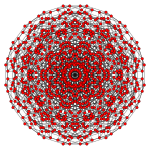 Runcitruncated 5-orthoplex |
 Runcicantellated 5-orthoplex |
 Runcicantitruncated 5-orthoplex |
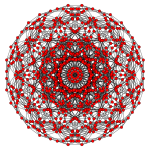 Runcitruncated 5-cube |
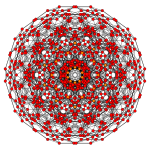 Runcicantellated 5-cube |
 Runcicantitruncated 5-cube |
| Orthogonal projections in B5 Coxeter plane | ||
|---|---|---|
In five-dimensional geometry, a runcinated 5-orthoplex is a convex uniform 5-polytope with 3rd order truncation (runcination) of the regular 5-orthoplex.
There are 8 runcinations of the 5-orthoplex with permutations of truncations, and cantellations. Four are more simply constructed relative to the 5-cube.
Runcinated 5-orthoplex
| Runcinated 5-orthoplex | ||
| Type | Uniform 5-polytope | |
| Schläfli symbol | t0,3{3,3,3,4} | |
| Coxeter-Dynkin diagram | ||
| 4-faces | 162 | |
| Cells | 1200 | |
| Faces | 2160 | |
| Edges | 1440 | |
| Vertices | 320 | |
| Vertex figure | 
| |
| Coxeter group | B5 [4,3,3,3] D5 [32,1,1] | |
| Properties | convex | |
Alternate names
- Runcinated pentacross
- Small prismated triacontiditeron (Acronym: spat) (Jonathan Bowers)[1]
Coordinates
The vertices of the can be made in 5-space, as permutations and sign combinations of:
- (0,1,1,1,2)
Images
| Coxeter plane | B5 | B4 / D5 | B3 / D4 / A2 |
|---|---|---|---|
| Graph | 
|

|

|
| Dihedral symmetry | [10] | [8] | [6] |
| Coxeter plane | B2 | A3 | |
| Graph | 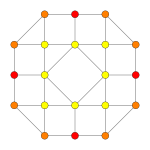
|

| |
| Dihedral symmetry | [4] | [4] |
Runcitruncated 5-orthoplex
| Runcitruncated 5-orthoplex | |
|---|---|
| Type | uniform 5-polytope |
| Schläfli symbol | t0,1,3{3,3,3,4} t0,1,3{3,31,1} |
| Coxeter-Dynkin diagrams | |
| 4-faces | 162 |
| Cells | 1440 |
| Faces | 3680 |
| Edges | 3360 |
| Vertices | 960 |
| Vertex figure | 
|
| Coxeter groups | B5, [3,3,3,4] D5, [32,1,1] |
| Properties | convex |
Alternate names
- Runcitruncated pentacross
- Prismatotruncated triacontiditeron (Acronym: pattit) (Jonathan Bowers)[2]
Coordinates
Cartesian coordinates for the vertices of a runcitruncated 5-orthoplex, centered at the origin, are all 80 vertices are sign (4) and coordinate (20) permutations of
- (±3,±2,±1,±1,0)
Images
| Coxeter plane | B5 | B4 / D5 | B3 / D4 / A2 |
|---|---|---|---|
| Graph | 
|

|

|
| Dihedral symmetry | [10] | [8] | [6] |
| Coxeter plane | B2 | A3 | |
| Graph | 
|

| |
| Dihedral symmetry | [4] | [4] |
Runcicantellated 5-orthoplex
| Runcicantellated 5-orthoplex | ||
| Type | Uniform 5-polytope | |
| Schläfli symbol | t0,2,3{3,3,3,4} t0,2,3{3,3,31,1} | |
| Coxeter-Dynkin diagram | ||
| 4-faces | 162 | |
| Cells | 1200 | |
| Faces | 2960 | |
| Edges | 2880 | |
| Vertices | 960 | |
| Vertex figure | 
| |
| Coxeter group | B5 [4,3,3,3] D5 [32,1,1] | |
| Properties | convex | |
Alternate names
- Runcicantellated pentacross
- Prismatorhombated triacontiditeron (Acronym: pirt) (Jonathan Bowers)[3]
Coordinates
The vertices of the runcicantellated 5-orthoplex can be made in 5-space, as permutations and sign combinations of:
- (0,1,2,2,3)
Images
| Coxeter plane | B5 | B4 / D5 | B3 / D4 / A2 |
|---|---|---|---|
| Graph | 
|

|

|
| Dihedral symmetry | [10] | [8] | [6] |
| Coxeter plane | B2 | A3 | |
| Graph | 
|
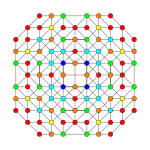
| |
| Dihedral symmetry | [4] | [4] |
Runcicantitruncated 5-orthoplex
| Runcicantitruncated 5-orthoplex | ||
| Type | Uniform 5-polytope | |
| Schläfli symbol | t0,1,2,3{3,3,3,4} | |
| Coxeter-Dynkin diagram |
||
| 4-faces | 162 | |
| Cells | 1440 | |
| Faces | 4160 | |
| Edges | 4800 | |
| Vertices | 1920 | |
| Vertex figure |  Irregular 5-cell | |
| Coxeter groups | B5 [4,3,3,3] D5 [32,1,1] | |
| Properties | convex, isogonal | |
Alternate names
- Runcicantitruncated pentacross
- Great prismated triacontiditeron (gippit) (Jonathan Bowers)[4]
Coordinates
The Cartesian coordinates of the vertices of a runcicantitruncated 5-orthoplex having an edge length of √2 are given by all permutations of coordinates and sign of:
Images
| Coxeter plane | B5 | B4 / D5 | B3 / D4 / A2 |
|---|---|---|---|
| Graph | 
|

|
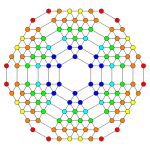
|
| Dihedral symmetry | [10] | [8] | [6] |
| Coxeter plane | B2 | A3 | |
| Graph | 
|

| |
| Dihedral symmetry | [4] | [4] |
Snub 5-demicube
The snub 5-demicube defined as an alternation of the omnitruncated 5-demicube is not uniform, but it can be given Coxeter diagram ![]()
![]()
![]()
![]()
![]()
![]()
![]() or
or ![]()
![]()
![]()
![]()
![]()
![]()
![]()
![]()
![]() and symmetry [32,1,1]+ or [4,(3,3,3)+], and constructed from 10 snub 24-cells, 32 snub 5-cells, 40 snub tetrahedral antiprisms, 80 2-3 duoantiprisms, and 960 irregular 5-cells filling the gaps at the deleted vertices.
and symmetry [32,1,1]+ or [4,(3,3,3)+], and constructed from 10 snub 24-cells, 32 snub 5-cells, 40 snub tetrahedral antiprisms, 80 2-3 duoantiprisms, and 960 irregular 5-cells filling the gaps at the deleted vertices.
Related polytopes
This polytope is one of 31 uniform 5-polytopes generated from the regular 5-cube or 5-orthoplex.
Notes
References
- H.S.M. Coxeter:
- H.S.M. Coxeter, Regular Polytopes, 3rd Edition, Dover New York, 1973
- Kaleidoscopes: Selected Writings of H.S.M. Coxeter, edited by F. Arthur Sherk, Peter McMullen, Anthony C. Thompson, Asia Ivic Weiss, Wiley-Interscience Publication, 1995, ISBN 978-0-471-01003-6 [1]
- (Paper 22) H.S.M. Coxeter, Regular and Semi Regular Polytopes I, [Math. Zeit. 46 (1940) 380-407, MR 2,10]
- (Paper 23) H.S.M. Coxeter, Regular and Semi-Regular Polytopes II, [Math. Zeit. 188 (1985) 559-591]
- (Paper 24) H.S.M. Coxeter, Regular and Semi-Regular Polytopes III, [Math. Zeit. 200 (1988) 3-45]
- Norman Johnson Uniform Polytopes, Manuscript (1991)
- N.W. Johnson: The Theory of Uniform Polytopes and Honeycombs, Ph.D.
- Klitzing, Richard. "5D uniform polytopes (polytera)". x3o3o3x4o - spat, x3x3o3x4o - pattit, x3o3x3x4o - pirt, x3x3x3x4o - gippit
External links
- Glossary for hyperspace, George Olshevsky.
- Polytopes of Various Dimensions, Jonathan Bowers
- Runcinated uniform polytera (spid), Jonathan Bowers
- Multi-dimensional Glossary
































